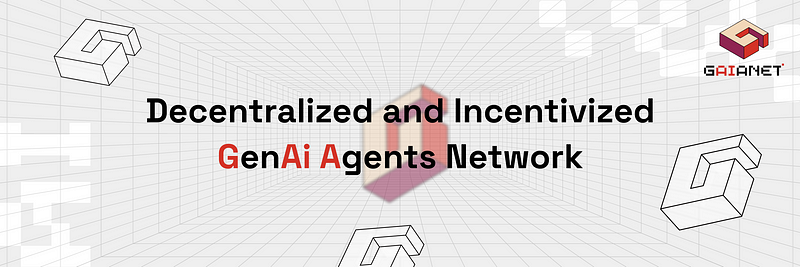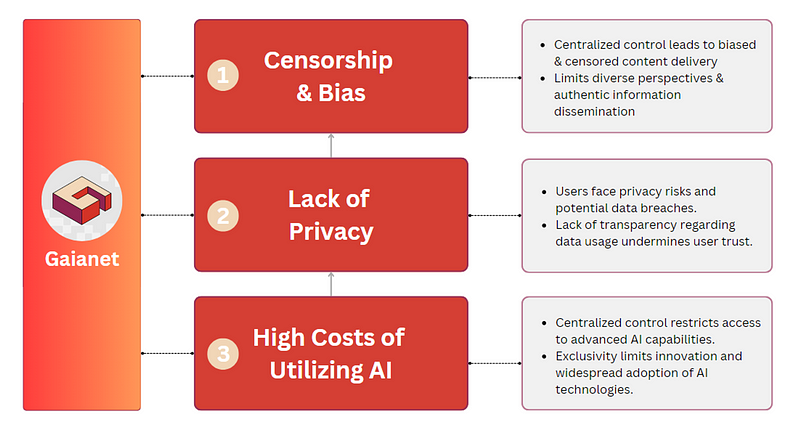Revolutionizing AI with Decentralization and Specialized Node Architecture
In a rapidly evolving landscape of artificial intelligence, GaiaNet emerges as a trailblazer, reshaping the narrative.

In a rapidly evolving landscape of artificial intelligence, GaiaNet emerges as a trailblazer, reshaping the narrative with its decentralized architecture and specialized node technology. With a focus on transparency, efficiency, and innovation, GaiaNet represents a paradigm shift in AI technology, offering a unique experience within the decentralized AI ecosystem.
GaiaNet’s philosophy is rooted in the belief that decentralization shouldn’t equate to limitation but rather serve as a catalyst for unleashing AI’s full potential. By decentralizing AI services, GaiaNet democratizes access, fosters transparency, and promotes innovation. Moreover, GaiaNet recognizes that the AI journey is not just about the results generated but also the process of obtaining the data used to generate them. By acknowledging the biased data cycle from centralized servers to biased AI output, GaiaNet aims to break this cycle, ensuring fairness and integrity in today's AI systems, and the future.
In the traditional landscape of AI, the focus has primarily been on the results generated by AI models — whether it’s accurate predictions, efficient processing, or innovative solutions or actions. Users often interact with AI systems without much consideration for the underlying data that fuels these results. As a result, issues such as bias, discrimination, and privacy violations may go unnoticed, leading to mistrust and skepticism towards AI technologies.

However, as awareness grows about the importance of data in AI systems, the narrative surrounding AI is simultaneously undergoing a profound shift. Users are no longer content with just the outcomes produced by AI models; they’re also concerned about the data used to train and fine-tune these models. This shift in perspective marks a significant milestone in the evolution of AI, as it underscores the importance of transparency, fairness, and integrity in AI systems.
For example, consider a healthcare AI model designed to assist in diagnosing medical conditions. In the traditional approach, users may only focus on the accuracy of the diagnoses produced by the model, overlooking the quality and diversity of the data used to train the model. As a result, the AI model may inadvertently exhibit biases or inaccuracies that could impact patient care and outcomes.
In contrast, with a heightened awareness of the data used in AI systems, users are more vigilant about ensuring that the data is representative, diverse, and ethically sourced. They understand that biased or incomplete data can lead to skewed results and reinforce existing inequalities in society. Therefore, they advocate for greater transparency and accountability in AI systems, demanding access to information about the data sources, collection methods, and data processing techniques used by AI models.
Similarly, in the realm of financial AI, users may be primarily concerned with the profitability and efficiency of trading algorithms, overlooking the potential risks and ethical implications associated with the data used to train these algorithms. Without proper scrutiny of the data, AI models may inadvertently contribute to market manipulation or exacerbate financial inequalities.
However, as users become more informed about the data-driven nature of AI, they recognize the importance of ethical data practices in financial AI. They demand transparency from financial institutions and algorithm developers, insisting on audits and oversight to ensure that AI models are trained on fair and unbiased data. By holding AI systems accountable for the data they use, users can help mitigate risks and promote fairness and trust in financial markets.
The future of AI stands to be forever changed as users become increasingly aware of not just the results generated by AI systems but also the data used to generate those results. This paradigm shift represents a fundamental reevaluation of the role of data in AI and underscores the importance of transparency, fairness, and accountability in AI systems. By advocating for ethical data practices and demanding greater transparency, users can help shape a future where AI serves the common good and benefits society as a whole.
At the heart of GaiaNet’s philosophy lies its revolutionary node architecture, each encapsulating a unique combination of specialized AI capabilities. These GaiaNet nodes provide a specialized API service, tailored to meet the diverse needs of users and developers. Each node comprises:
- Specialized and Fine-Tuned LLM: GaiaNet nodes leverage advanced language models to excel in specific domains, delivering precise and efficient responses, whether it’s answering programming questions or providing insights into complex projects.
- Domain-Specific Knowledge Base: Powered by extensive domain-specific knowledge, GaiaNet nodes offer comprehensive insights into various subjects, empowering users with actionable information tailored to their needs.
- Inference App for Context Management: With sophisticated inference apps, GaiaNet nodes manage context and conversation history seamlessly, ensuring continuity in interactions and delivering contextually relevant responses for an enhanced user experience.
- Compute Resources for AI Processing: Equipped with high-performance compute resources, including Nvidia GPUs and Mac M3 devices, GaiaNet nodes ensure optimal performance and scalability, capable of handling complex computations and running intensive AI models.
In addition to its node architecture, GaiaNet features a robust protocol that connects and incentivizes nodes, forming a cohesive network of AI services. This protocol facilitates seamless discovery, connection, and payment for GaiaNet node services through a decentralized marketplace, democratizing access to AI technologies and empowering users and developers to leverage specialized AI capabilities effortlessly.
Ultimately, it’s clear that GaiaNet stands at the forefront of a new era in AI technology. As the demand for specialized AI capabilities continues to grow, GaiaNet remains a unique project committed to empowering users and developers with cutting-edge solutions that don’t just solve the problems of today, but also the problems of the future. By embracing decentralization and transparency, GaiaNet paves the way for a more inclusive and equitable AI ecosystem, where the full potential of AI can be realized. Join us in shaping the future of AI with GaiaNet.


